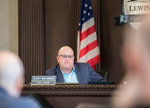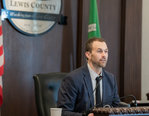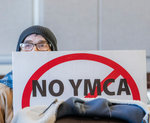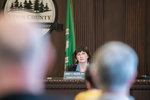














For the second time, after a lawsuit was filed to appeal its unanimous opposing vote in November, the Lewis County Board of Commissioners (BOCC) heard public testimony on a proposed rezone of 500 acres next to Mineral Lake at the courthouse on Tuesday morning.
The regular Tuesday business meeting, which began at 10 a.m., went on well into the afternoon.
The land in question is owned by the YMCA of Greater Seattle and sits within the 150-person unincorporated community of Mineral between Elbe and Morton.
Proponents of the YMCA’s who hope to build an overnight youth camp on the site say it would bring educational opportunities, economic benefits and keep the forest land mostly as-is. Opponents say the town’s infrastructure — namely water systems and roadways — isn’t suited for the around 400 campers and 100 staffers the YMCA could host in maximum capacity. Opponents also claim a camp could “eviscerate” the way of life for Mineral residents, threaten the peace of the rural area and have negative environmental impacts.
However, while the YMCA has made its eventual intentions for the land clear, the question of whether or not to rezone the land is not meant to be made with the project in mind, according to the county’s Senior Long-Range Planner Mindy Brooks. Instead, rezoning must meet specific requirements in state and county law pertaining to land usage specifically.
“What you are deciding is if the use is appropriate at this location. Just a reminder that the use is a master planned resort, the use is not based on the ownership,” Brooks told the BOCC and meeting attendees. “You cannot make a decision based on the ownership of the property. The decision to allow or reject must be the same regardless of who owns it. The use is also not a project.”
Her presentation was followed by a nearly two-hour question and answer period, where inquiries by commissioners and attendees included whether the camp, if built, could have certain regulations such as buffer zones between buildings and the lake. Brooks said yes, on the project level, those requirements could be set forth.
Then, a hearing commenced, beginning with Republican Lewis County Sheriff Rob Snaza saying coverage of East Lewis County was already a strain on his staff. He claimed the department “can’t commit” to providing coverage to the property. The YMCA previously said it is in conversations with local emergency services and would be addressing potential issues in a binding site plan. If the rezone is granted, the nonprofit would be required to produce a site plan within a few years following, lest the property be zoned back to forest resource land.
Winlock Mayor Brandon Svenson, who is also Chair of the Lewis County Republican party, was another local official to oppose the rezone, saying Winlock has suffered from decades of uncertainty in the wake of a rezone on its current industrial park area in the early 2000s.
In encouraging more government oversight of land use, Svenson and Snaza differ from their Republican counterparts at the state level, including state Sen. John Braun, R-Centralia and Ed Orcutt, R-Kalama. In a recent interview with The Chronicle, the two spoke in favor of loosening State Environmental Policy Act restrictions in order to ease development in favor of private property owners.
Other speakers at Tuesday’s hearing included several Mineral and East Lewis County residents. Some were in favor of the YMCA, including its education programs and forestry practices. Largely, though, the hearing was dominated by opposition. One Mineral resident, Mark Waters, even claimed the rezone would “eviscerate the quality of life” for neighbors of the property. Many of the attendees read from written statements, some of which had been read at the hearing when it was first held in November.
Before the YMCA’s lawsuit against Lewis County was filed, which claims the county violated the land rights of the nonprofit, the BOCC originally voted against the YMCA rezone proposal, with Commissioner Sean Swope citing ideological variables such as the organization’s stance on race and transgender issues. The lawsuit calls these comments discriminatory. Commissioner-at-the-time Lee Grose raised concerns over the Y’s partnership with the Nisqually Indian Tribe and Commissioner Lindsey Pollock said little beyond “nay.”
Commissioner Scott Brummer, who took Grose’s place on the board, disclosed ahead of the hearing that on the campaign trail, he’d voiced his opposition to the project, but said he remained open to decision ahead of the hearing.
Written testimony, which can be emailed to mindy.brooks@lewiscountywa.gov, will close at 4 p.m. on Friday. The BOCC will reconvene on the rezone proposal on Feb. 27 for deliberation and voting, but no public hearing will be held at that time.